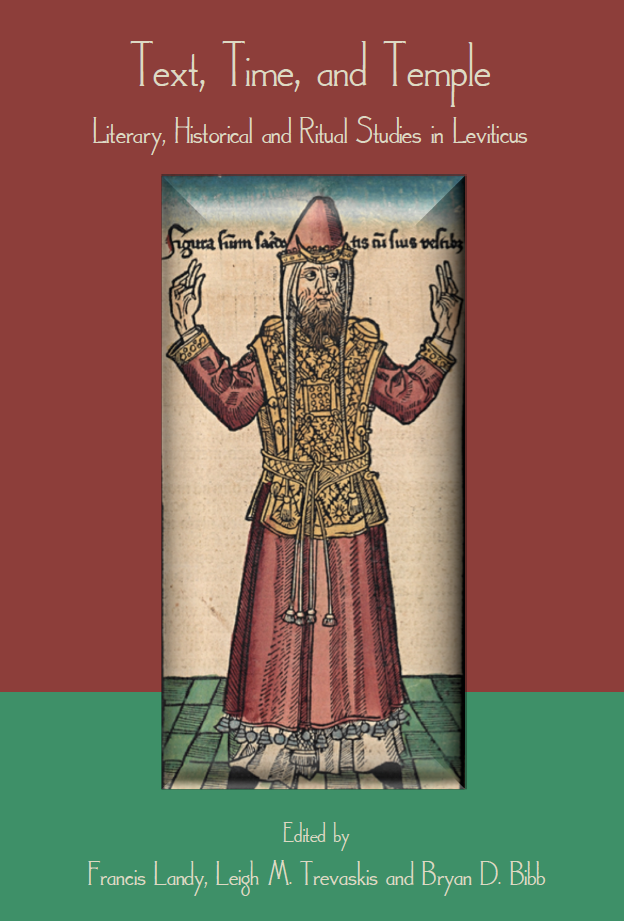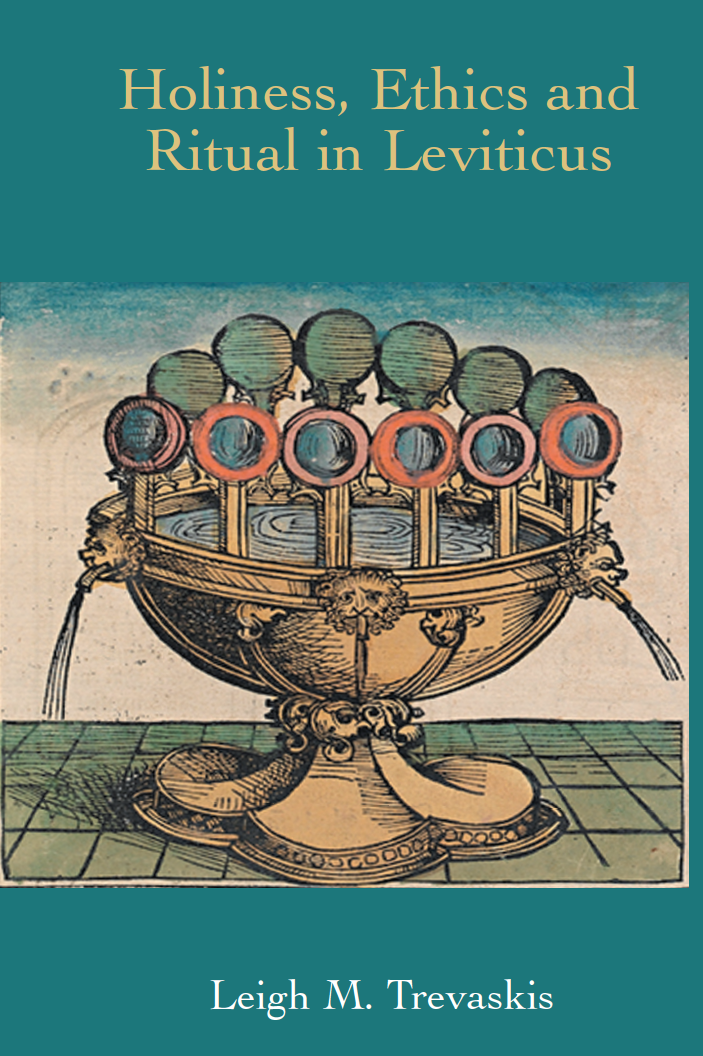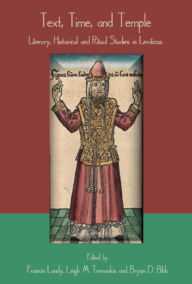Text, Time, and Temple: Literary, Historical and Ritual Studies in Leviticus
Published: Mar 2015
£60.00
In their different ways the essays in this collection ask, Why was Leviticus written? What is the relation of text to practice, and to the development of the idea of an Israelite society centred in its Temple through all vicissitudes of its history?
The thirteen contributors are engaged in exploring the intersection of literary, historical and ritual approaches to Leviticus, as the central book of the Torah and as a utopian vision of an ideal society. Leading scholars of Leviticus and the Pentateuch, like James Watts, Israel Knohl and Christophe Nihan, combine with others whose primary interest is magic, reception, cultural memory and gender.
The collection begins with a chapter by Michael Hundley on the ancient Near Eastern background of the priestly code and the issue of divine fluidity. Several scholars consider the social function of the book, particularly in the Second Temple period. James Watts, for instance, thinks that it combats scepticism about the efficacy of ritual; Reinhard MÌ_ller argues that the 'I am Yhwh' formula locates the texts in a liturgical setting. Christophe Nihan discusses the manipulation of blood in sacrifice as having an indexical function, as part of the 'templization' of Israel.
Other chapters engage in analyses of particular texts. Leigh Trevaskis advocates a symbolic interpretation of the prohibition of intercourse with a menstruant. Deborah Rooke analyses the gender and ethnic implications of the story of the blasphemer in Leviticus 24. Similarly, Francis Landy compares the chapters on the Nazirite and the woman suspected of adultery as challenges to the sacerdotal order. Jonathan Burnside argues that the prohibition of necromancy is integral to Leviticus 20. The book concludes with a moving reflection by Jeremy Milgrom on his father's views on the ethical implications of his work, and particularly its relevance to Israeli —Palestinian relations.
Text, Time, and Temple: Literary, Historical and Ritual Studies in Leviticus
£60.00
In their different ways the essays in this collection ask, Why was Leviticus written? What is the relation of text to practice, and to the development of the idea of an Israelite society centred in its Temple through all vicissitudes of its history?
The thirteen contributors are engaged in exploring the intersection of literary, historical and ritual approaches to Leviticus, as the central book of the Torah and as a utopian vision of an ideal society. Leading scholars of Leviticus and the Pentateuch, like James Watts, Israel Knohl and Christophe Nihan, combine with others whose primary interest is magic, reception, cultural memory and gender.
The collection begins with a chapter by Michael Hundley on the ancient Near Eastern background of the priestly code and the issue of divine fluidity. Several scholars consider the social function of the book, particularly in the Second Temple period. James Watts, for instance, thinks that it combats scepticism about the efficacy of ritual; Reinhard MÌ_ller argues that the 'I am Yhwh' formula locates the texts in a liturgical setting. Christophe Nihan discusses the manipulation of blood in sacrifice as having an indexical function, as part of the 'templization' of Israel.
Other chapters engage in analyses of particular texts. Leigh Trevaskis advocates a symbolic interpretation of the prohibition of intercourse with a menstruant. Deborah Rooke analyses the gender and ethnic implications of the story of the blasphemer in Leviticus 24. Similarly, Francis Landy compares the chapters on the Nazirite and the woman suspected of adultery as challenges to the sacerdotal order. Jonathan Burnside argues that the prohibition of necromancy is integral to Leviticus 20. The book concludes with a moving reflection by Jeremy Milgrom on his father's views on the ethical implications of his work, and particularly its relevance to Israeli —Palestinian relations.
Holiness, Ethics and Ritual in Leviticus
Published: Feb 2011
£70.00
In this book, Trevaskis argues that holiness in Leviticus always has an ethical dimension, and is not simply a cultic category. In so doing he departs from the usual view that in Leviticus 1 —16 (P) holiness is largely a cultic concept. Biblical scholars have commonly read ritual texts as practical instruction or prescription, inferring the theological significance of the rituals from elsewhere. For example, theological interpretations of the 'burnt offering' have been derived from its use in narrative settings (e.g. Gen. 8:20; 22:13) rather than from its legal prescription in Leviticus 1.
Trevaskis, however, argues that an implicit command to be holy exists within some ritual texts in Leviticus, which are more than mere ritual prescriptions. It is in the symbolic dimensions of the rituals that the theological significance lies. In support of this argument, he undertakes exegetical studies of the 'burnt offering' (Leviticus 1), of the 'purity regulations' (Leviticus 11 —15) and of the physical appearance of priests and sacrificial animals (Leviticus 21 —22). These studies take place within a methodological framework that avoids capricious symbolic interpretations. Trevaskis draws on cognitive linguistic insights to discern when a text may allude to other texts within the Pentateuch (especially Genesis 1 —3), and attends to the legislator's use of various rhetorical devices (e.g. 'rhetorical progression').
Since the command to 'be holy' in Leviticus 17 —26 (H) only makes explicit what P leaves implicit in Leviticus 1 —16, this study has important implications for the compositional history of Leviticus. It becomes much less clear that H's ethical view of holiness developed from a prophetic critique of P (as Milgrom and Knohl, for example, argue).
Holiness, Ethics and Ritual in Leviticus
£70.00
In this book, Trevaskis argues that holiness in Leviticus always has an ethical dimension, and is not simply a cultic category. In so doing he departs from the usual view that in Leviticus 1 —16 (P) holiness is largely a cultic concept. Biblical scholars have commonly read ritual texts as practical instruction or prescription, inferring the theological significance of the rituals from elsewhere. For example, theological interpretations of the 'burnt offering' have been derived from its use in narrative settings (e.g. Gen. 8:20; 22:13) rather than from its legal prescription in Leviticus 1.
Trevaskis, however, argues that an implicit command to be holy exists within some ritual texts in Leviticus, which are more than mere ritual prescriptions. It is in the symbolic dimensions of the rituals that the theological significance lies. In support of this argument, he undertakes exegetical studies of the 'burnt offering' (Leviticus 1), of the 'purity regulations' (Leviticus 11 —15) and of the physical appearance of priests and sacrificial animals (Leviticus 21 —22). These studies take place within a methodological framework that avoids capricious symbolic interpretations. Trevaskis draws on cognitive linguistic insights to discern when a text may allude to other texts within the Pentateuch (especially Genesis 1 —3), and attends to the legislator's use of various rhetorical devices (e.g. 'rhetorical progression').
Since the command to 'be holy' in Leviticus 17 —26 (H) only makes explicit what P leaves implicit in Leviticus 1 —16, this study has important implications for the compositional history of Leviticus. It becomes much less clear that H's ethical view of holiness developed from a prophetic critique of P (as Milgrom and Knohl, for example, argue).




